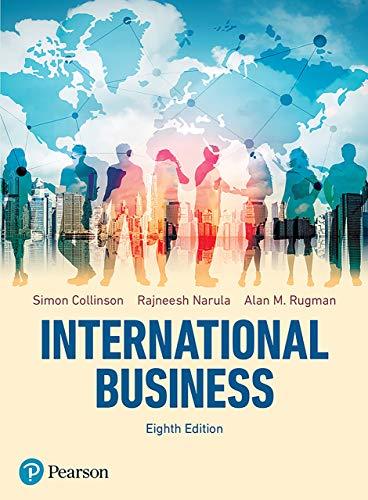One of the biggest complications in international trade is the ability of domestic producers to lobby their
Question:
One of the biggest complications in international trade is the ability of domestic producers to lobby their home governments to erect barriers to trade. This varies country by country in terms of the legal frameworks that determine how and to what extent this is allowed and in terms of its impact on trade agreements. Global trade agreements also limit how far individual countries can apply local protectionist measures. In the past, the textile, apparel, and shoe industries, for example, were able to obtain protection from cheaper imports through tariffs, quotas and special measures. Now multilateral trade agreements under the GATT and WTO (and also regional and bilateral agreements such as NAFTA and the emerging Asian Pacific Economic Cooperation forum) outlaw these instruments of protection.
However, to some extent, some of these agreements have been undermined by more subtle approaches to protectionism. Prominent as a new type of protectionist device is the use of ‘unfair trade laws’, especially anti-dumping (AD) and countervailing duty (CVD) actions. The economic logic of AD and CVD makes some sense. It is unfair for a foreign producer to ‘dump’ a product in your country below its price in the home country, or below the cost of producing it. Similarly, subsidised foreign products should be offset by a CVD of equivalent effect. The problem, however, lies with the administration of the trade laws, which is subject to political lobbying.
A variety of studies have found that the bureaucrats who administer AD and CVD laws are subject to capture by the home industries, which then use AD and CVD cases as harassment tools against often economically efficient foreign rival producers. For example, Rugman and Anderson (1987) found that the US administration of AD and CVD was used in a biased manner against Canadian producers, especially in resource-based industries such as softwood lumber, fishing and agriculture. Thus, in the Canadian–US Free Trade Agreement of 1989, and again in NAFTA, five-person binational panels of trade law experts were set up to review the decision of the US (and Canadian) trade law agencies. More recently, in 2019 the US announced its intentions to withdraw from a sixyear- old trade agreement with Mexico concerning the trade of tomatoes (see full case study in Chapter¤18). This agreement had previously averted a trade war over tomatoes in 2013, by establishing a floor price for the Mexican product in the United States and stopping US farmers from pursuing anti-dumping charges against Mexican exporters. Some see this as a way for the US to impose new tariffs on such products.
In a subsequent study, Rugman and Anderson (1987) found that these binational panels were able to remand back (i.e., successfully challenge) the decision of the US agencies twice as often in cases involving Canada as in AD and CVD cases involving the rest of the world. In related work researchers have found that the EU is just as bad as the United States when it comes to taking questionable AD measures, especially against Asian countries. Indeed, one of the unresolved problems is how smaller countries can secure access to the protected markets of triad economies such as the United States and the EU. In Japan’s case, there are similar arguments (including those from its triad rivals) that it has entry barriers in place preventing market access.
Step by Step Answer:

International Business
ISBN: 9781292274157
8th Edition
Authors: Simon Collinson, Rajneesh Narula, Alan M. Rugman





